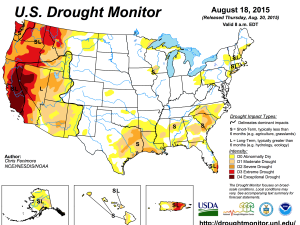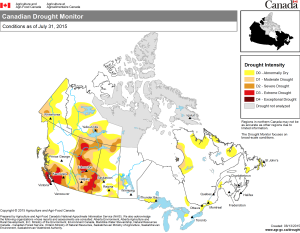Unprecedented water use restrictions, due to widespread and extreme drought, are in force in western parts of the US and Canada.California is in its worst drought on record. Widespread water shortages have prompted state governor Jerry Brown to proclaim a State of Emergency and issue an executive order mandating a variety of water restriction measures and targets.
Western Canada, too, is exceptionally dry. Here is what it looked like at the end of July, before the weather got hotter and dryer:
BC has been struggling with an exceptionally hot and dry summer. The reservoir levels have been so low in Vancouver that the city has had to impose severe water restrictions, enforced under the threat hefty fines for residents caught watering their lawns. The hot dry weather has also led to widespread wildfires.
And in Alberta, water levels are so critically low that the Alberta Energy Regulator (“AER”), the provincial body that regulates the oil sands, has announced temporary but extraordinary limits on water usage by oilsands operations.
These restrictions apply to Temporary Diversion Licences (“TDLs”) for oil and gas companies operating in particularly water-stressed areas, including the Upper Athabasca River basin. Current TDLs in these designated areas are suspended and/or new applications for TDLs are not being accepted. Despite these restrictions, the river basin has far too little water to support natural ecosystem functioning.
The AER is also “encouraging” oil and gas operators to voluntarily reduce water consumption in areas where mandatory restrictions are not currently being applied.
Oilsands operations consume (and contaminate) a staggering amount of water, the majority of which is drawn from the Athabasca River. The restrictions announced by the AER, while disruptive to industry, are essential due to the severity of the drought on the province’s population and river ecosystems.
The frequency and severity of droughts is expected to increase in the coming years as result of climate change. Indeed, scientists have now linked the extremity of the drought currently wracking California to human-caused climate change. As a result, the oilsands and other water-intensive industries can likely expect such disruptions to become a more regular event.

